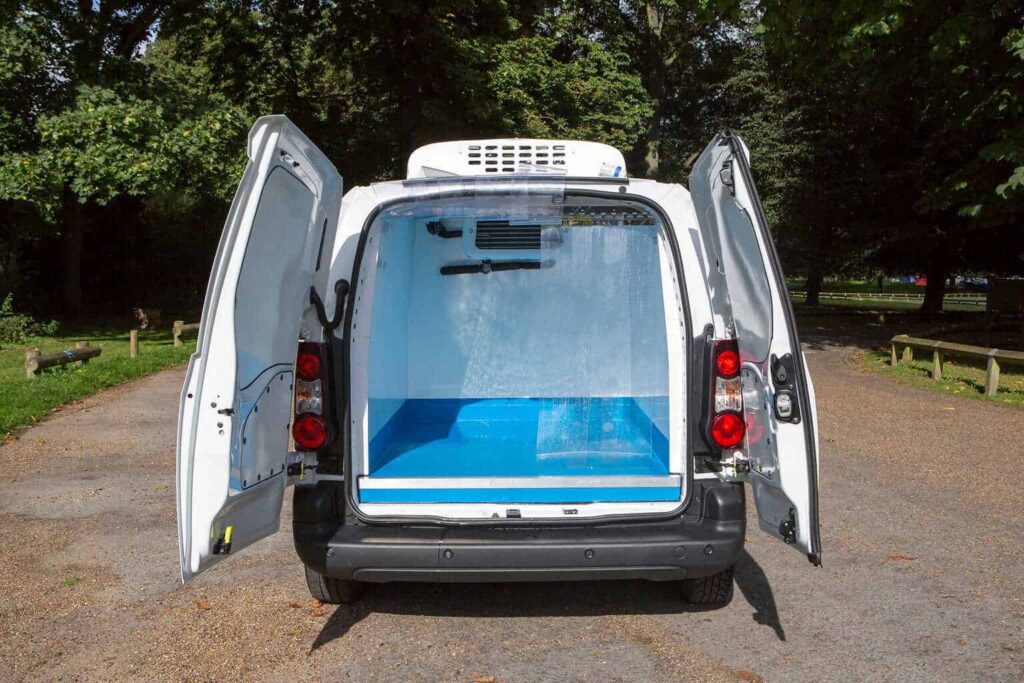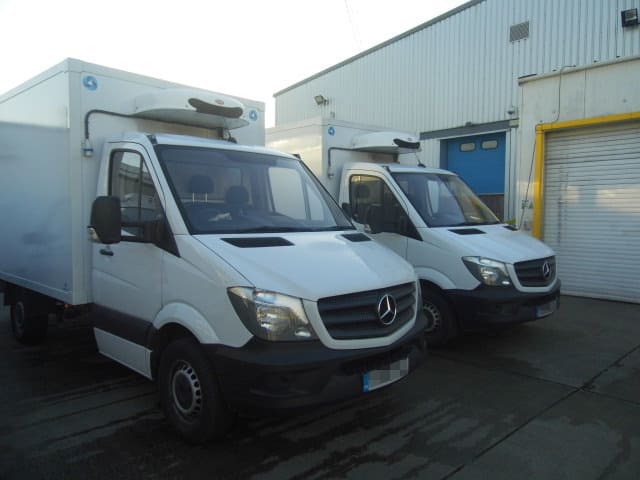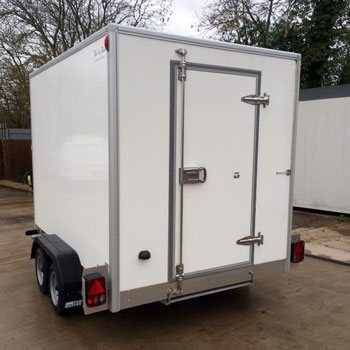Refrigerated van fleets are crucial to various sectors, playing an essential role in the supply chain for industries such as food transportation, pharmaceuticals, floriculture, and more.
In the food industry, maintaining the correct temperature throughout the delivery process is vital to prevent spoilage and ensure compliance with stringent safety regulations.
Pharmaceuticals, on the other hand, require precise temperature control to preserve the efficacy of medicines, making reliable refrigerated transport a non-negotiable aspect of the business. The need for specialised vehicles that can consistently maintain the required temperatures is therefore paramount across these industries.
Challenges of Managing a Large Refrigerated Van Fleet
Managing a large fleet of refrigerated vans presents a unique set of challenges that require careful consideration and strategic planning. From ensuring the vehicles are well-maintained to staying ahead of the competition and making critical investment decisions, businesses must navigate a complex landscape to maintain efficiency and profitability.
Routine Maintenance
Routine maintenance is crucial in keeping a fleet of refrigerated vans operational and efficient. Regular maintenance ensures that both the mechanical and cooling systems of the vans are functioning correctly, preventing costly breakdowns and operational delays. The importance of these checks cannot be overstated, as even minor issues in a refrigerated van’s cooling system can lead to significant problems, such as temperature fluctuations that compromise the quality of perishable goods.
Refrigerated vans face specific maintenance issues that go beyond standard mechanical upkeep. Cooling systems are particularly vulnerable to wear and tear, and any malfunction can have severe consequences. A breakdown in the cooling system not only risks the integrity of the transported goods but also incurs additional costs for repairs and potential fines for non-compliance with industry regulations.
Breakdowns and Repairs
Unexpected breakdowns pose a logistical nightmare for businesses that rely on refrigerated vans, especially when perishable goods are involved. The consequences of a breakdown can be immediate and severe, with potential losses far exceeding the cost of repairs. For example, if a van carrying temperature-sensitive goods like pharmaceuticals or fresh produce breaks down, the risk of spoilage or degradation is high, leading to financial losses and damage to the company’s reputation.
Fleet Management Software
Fleet management software plays a vital role in managing logistics, scheduling maintenance, and ensuring compliance with industry standards. These software solutions provide businesses with real-time data on vehicle performance, allowing for proactive maintenance and early detection of potential issues. Additionally, fleet management software helps in optimising routes, tracking fuel consumption, and ensuring that the fleet adheres to regulatory requirements.
Staying Ahead of the Competition
The refrigerated transport industry is highly competitive, particularly in sectors like food and pharmaceuticals, where timely and reliable delivery is critical. Businesses operating in these industries must continually differentiate themselves to stay ahead of the competition. This differentiation often comes down to factors such as efficiency, reliability, and customer service, all of which are directly influenced by the management of their refrigerated van fleet.
To stay competitive, businesses must adopt innovative practices and technologies that enhance the performance of their refrigerated van fleet. Advances in refrigerated van technology, such as more efficient cooling systems, GPS tracking, and telematics, have revolutionised the industry. These innovations allow businesses to monitor their fleet in real-time, ensuring that temperature controls are maintained, routes are optimised, and deliveries are made on time.
For instance, telematics systems provide detailed data on vehicle performance, driver behaviour, and fuel efficiency, enabling businesses to make informed decisions that improve overall fleet management. Similarly, advanced temperature control systems ensure that goods are kept at the correct temperature throughout the journey, reducing the risk of spoilage and enhancing customer satisfaction.
Capital Expenditure vs. Operational Expenditure
Outright purchase requires a substantial upfront investment, which can be a financial burden, especially for smaller businesses. Additionally, owning the fleet means taking on the risks associated with depreciation and ongoing maintenance costs.
Leasing or hiring, on the other hand, offers greater financial flexibility. It allows businesses to spread the cost over time, reducing the impact on cash flow.
Scalability
Scalability is a key consideration in fleet management, particularly in industries with fluctuating demand. The ability to scale the fleet up or down in response to market conditions is crucial for maintaining operational efficiency and controlling costs.
This is particularly beneficial for businesses that experience seasonal demand fluctuations, such as those in the food industry. During peak periods, businesses can quickly increase their fleet size to meet demand, and then scale down when the demand subsides, ensuring optimal use of resources.
Depreciation and Residual Value
Understanding the depreciation of refrigerated vans is essential for effective fleet management. Refrigerated vehicles typically depreciate faster than standard vans due to the additional wear and tear on the cooling systems. This depreciation can significantly impact the residual value of the fleet, making outright purchase a less attractive option for some businesses.
Switching to Electric Vehicles
Switching to electric refrigerated vans presents several challenges, including range anxiety, limited charging infrastructure, and the higher upfront cost of electric vehicles. Range anxiety, the fear that a vehicle will run out of battery before reaching its destination, is a significant concern for businesses that operate over long distances or in areas with limited charging facilities.
Industry-Specific Challenges
Different industries that rely on refrigerated transport face unique challenges, each shaped by the specific needs and regulations governing their operations.
Food Transportation
Food products, particularly those like dairy, meat, and seafood, require consistent temperatures throughout the entire transportation process. Any deviation from the required temperature range can result in spoilage, leading to significant financial losses and potential harm to consumers.
The logistical challenges of delivering food products to multiple locations while ensuring consistent temperature control can be considerable. Refrigerated vans must be equipped with reliable and precise cooling systems that can maintain the correct temperature, even in fluctuating external conditions.
The food transportation industry is heavily regulated, with stringent requirements to ensure the safety and quality of food products. One of the key regulatory frameworks in this sector is the Hazard Analysis and Critical Control Points (HACCP) system, which mandates strict monitoring and control of potential hazards, including temperature management during transport..
Pharmaceuticals
Pharmaceutical products are often highly sensitive to temperature variations, making their transportation a critical challenge. Many pharmaceuticals, including vaccines, biologics, and certain medications, must be kept within narrow temperature ranges to maintain their efficacy. Any deviation from these temperatures, even for a short period, can render these products ineffective or unsafe, leading to significant financial losses and, more importantly, potential risks to patient health.
The stakes involved in pharmaceutical transport are incredibly high, given the potential consequences of temperature excursions. Even minor deviations from the required temperature range can lead to the loss of entire shipments, resulting in substantial financial losses and supply chain disruptions.
Other Industries
Beyond food and pharmaceuticals, other industries also rely on refrigerated transport to meet their specific needs. The floriculture industry, for instance, requires precise temperature and humidity control to maintain the freshness and quality of flowers during transport. Flowers are highly perishable and can quickly wilt or lose their appeal if exposed to incorrect temperatures, making reliable refrigerated transport essential for florists and flower distributors.
Similarly, the chemical industry often deals with substances that require stable temperatures to ensure their safety and efficacy. Certain chemicals may be highly reactive or degrade when exposed to temperatures outside their designated range, posing significant risks during transport.
Benefits of Working with a Specialist Provider like FridgeXpress
When managing a large fleet of refrigerated vans, partnering with a specialist provider like FridgeXpress offers numerous advantages.
From accessing industry-specific expertise to benefiting from a wide range of vehicles and flexible leasing options, businesses can significantly enhance their operations by leveraging the services of a provider who understands the complexities of refrigerated transport. This section explores the key benefits of working with a specialist provider like FridgeXpress.
Specialist Knowledge
One of the primary benefits of partnering with a specialist provider like FridgeXpress is the access to expert knowledge and experience in the field of refrigerated transport. The intricacies of managing temperature-sensitive logistics require a deep understanding of both the vehicles involved and the specific needs of the industries they serve.
FridgeXpress brings this expertise to the table, offering businesses invaluable advice on selecting the right vehicles for their needs, optimising maintenance practices, and ensuring compliance with industry regulations.
Fleet Variety
Another significant advantage of working with a specialist provider like FridgeXpress is access to a broad range of refrigerated vehicles. Businesses have diverse needs when it comes to transporting temperature-sensitive goods, and having access to a variety of vehicles—from small vans to large trucks—ensures that they can choose the right solution for each specific task. Whether a business requires compact vehicles for urban deliveries or large trucks for bulk transportation, FridgeXpress can provide the appropriate vehicle to match their requirements.
This variety in the fleet allows businesses to optimise their operations, selecting vehicles that are not only fit for purpose but also cost-effective. By using the right vehicle for the job, businesses can improve fuel efficiency, reduce operational costs, and enhance overall logistical efficiency.
Latest Models and Technologies
Staying competitive in the refrigerated transport industry often depends on having access to the latest vehicle models and technologies. FridgeXpress ensures that its fleet is regularly updated with the newest vans equipped with modern technology, providing businesses with cutting-edge solutions for their transportation needs. These vehicles come with advanced features such as enhanced temperature control systems, real-time monitoring, and fuel-efficient engines, all of which contribute to more reliable and cost-effective operations.
Maintenance and Servicing Included
One of the most significant benefits of contract leasing through a specialist provider like FridgeXpress is the inclusion of maintenance and servicing as part of the agreement. Managing a fleet of refrigerated vans involves ongoing maintenance to ensure that the vehicles remain reliable and efficient. When businesses lease vehicles from FridgeXpress, they can rest assured that maintenance and servicing are taken care of, significantly reducing the administrative burden on their internal teams.
This arrangement not only saves businesses time and resources but also leads to cost savings by minimising the risk of unexpected breakdowns and repairs. Regular maintenance ensures that vehicles operate at peak performance, reducing downtime and preventing costly disruptions to the supply chain. By entrusting maintenance to FridgeXpress, businesses can focus on their core operations without worrying about the upkeep of their fleet.
Scalability and Flexibility
In today’s dynamic business environment, the ability to scale operations quickly in response to changing demand is crucial. Contract leasing with FridgeXpress offers the flexibility to adjust fleet size according to business needs, allowing companies to scale their operations up or down as required. Whether a business experiences a seasonal spike in demand or needs to downsize during slower periods, FridgeXpress can quickly provide additional vehicles or retrieve them when they’re no longer needed.
This scalability is particularly beneficial for businesses in industries with fluctuating demand, such as food transportation or pharmaceuticals. By leasing vehicles rather than purchasing them outright, businesses can avoid the financial strain of maintaining an oversized fleet during low-demand periods while still having the capacity to expand rapidly when necessary.
Financial Benefits
Leasing refrigerated vans through FridgeXpress also offers significant financial advantages. One of the primary benefits is avoiding the large upfront costs associated with purchasing vehicles. Leasing allows businesses to spread the cost over time, improving cash flow and freeing up capital for other investments. Additionally, leasing agreements often include tax benefits, such as the ability to deduct lease payments as a business expense, further enhancing the financial attractiveness of this option.
Moreover, leasing mitigates the financial risks associated with vehicle depreciation. Refrigerated vans, like all vehicles, lose value over time, and owning a fleet means bearing the full cost of this depreciation. Leasing, on the other hand, transfers this risk to the leasing company, allowing businesses to focus on their operations without worrying about the declining value of their assets.
FridgeXpress operates across the UK and is the perfect partner for larger fleets. Want to find out more? Contact our expert team today.




